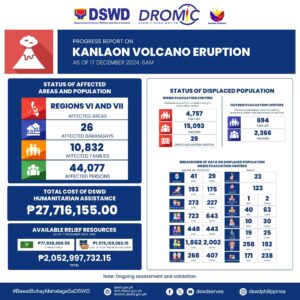A shift from herbal supplements to recognized drugs marks a significant milestone in the cycle of drug development, thanks to extensive clinical trials conducted by the National Integrated Research Program on Medicinal Plants – Institute of Herbal Medicine (NIRPROMP – IHM) that proved the efficacy and safety of the plant-based formulations.
These new medicines have gone through all the required pre-clinical trials and various phases of clinical testing as required by the Food and Drug Administration (FDA) for medicine formulations.
The new medicines were unveiled at the recent Philippine Pharma and Healthcare Expo in Pasay City this month.
The event showcased breakthrough medical advancements to attract commercial partners to manufacture and distribute to local markets.
Experts from the NIRPROMP – NIH, led by Dr. Nelia Maramba, have successfully derived a drug from Ulasimang Bato (also known as pansit-pansitan or pepper elder) into a safe and efficacious treatment for elevated levels of uric acid that clump together into crystals that cause gout – a painful inflammation of joints.
Clinical tests have proven Ulasimang Bato (pansit-pansitan or pepper elder) as a drug for hyperuricemia (high uric acid in the blood) without side effects.
“It was proven as efficacious as the standard treatment for hyperuricemia – the ones taken by patients and patients who took Ulasimang Bato did not experience side effects,” said Dr Lourdes Marie Tejero, Director of the Technology Transfer and Business Development Office (TTBDO).
The efforts of the Technology Transfer and Business Development Office (TTBDO) at the University of the Philippines – Manila have facilitated the transition of scientific innovations into commercial products. By promoting intellectual property applications, patent cooperation treaties, and business development strategies, TTBDO plays a crucial role in translating research into tangible benefits for society.
Aside from Ulasimang Bato, the other plant-based medicines that are awaiting commercial production and sales are Yerba Buena (to relieve pain due to operation, dysmenorrhea, childbirth, and circumcision), Ampalaya (anti-diabetes), and Tsaang Gubat (anti-colic; to relieve kabag).
“There was a dream in the 1970s that we should have affordable medicines for Filipinos. We have so many herbal medicines and the challenge was to make these into medicines. One success story is Lagundi has yielded more than P1 billion in sales, and Sambong made P17 million in sales in 2018,” Tejero added.
Other innovations from UP Manila that were presented during the Philippine Pharma and Healthcare Expo include a decontamination device developed by the team of experts led by Dr. Emmanuel Estrella of the Department of Epidemiology to make surgical instruments and N95 masks reusable; a molecular test that will determine the early onset of complications from Leptospirosis developed by a team led by Dr. Jose Nevado of the Institute of Human Genetics, and the AXEL Virtual Care: Immersive gamification technology system for cognitive and motor disabilities developed by the team of Professors Jaime dL Caro, Michael Tee, Roland Dominic Jamora, Veeda Michelle Anlacan, and Maria Eliza R. Aguila from the Augmented eXperience E-health Laboratory.
REFERENCE: DR. CESAR A. PEREZ, JR. DIRECTOR, INFORMATION PUBLICATION, AND PUBLIC AFFAIRS
OFFICE, UP MANILA 09178199766




